Important Information About Measles
Salem Public Health Nurse and Health Department encourages vaccination and education to protect yourself and your community
Posted on: May 13, 2019 - 12:22pm

According to the Center for Disease Control and Prevention (CDC), since January 2019, there are over 700 confirmed cases of measles in 22 states, including Massachusetts. This is the greatest number of cases reported in the United States since 1994 and since measles was declared eliminated in 2000. Public Health Nurses from North Shore communities have put together a list of the most important facts about measles.
- Measles can be serious. Some people think of measles as just a little rash and fever that clears up in a few days, but measles can cause serious health complications, especially in children younger than 5 years of age and adults over 20 years of age.
- Measles is very contagious. Measles spreads through the air when an infected person coughs or sneezes. It is so contagious that if one person has it, 9 out of 10 people around him or her will also become infected if they are not protected.
- You can still get measles in the United States. Every year, measles is brought into the United States by unvaccinated travelers (Americans or foreign visitors) who get measles while they are in other countries. Even if your family does not travel internationally, you could come into contact with measles anywhere in your community. Anyone who is not protected against measles is at risk.
- You have the power to protect yourself and community against measles with a safe and effective vaccine. The best protection against measles is measles-mumps-rubella (MMR) vaccine. MMR vaccine provides long-lasting protection against all strains of measles.
The CDC considers you protected from measles if you have written documentation (records) showing at least one of the following:
- You received two doses of measles-containing vaccine, and you are a(n) —
- school-aged child (grades K-12)
- adult who will be in a setting that poses a high risk for measles transmission, including students at post-high school education institutions, healthcare personnel, and international travelers.
- You received one dose of measles-containing vaccine, and you are a(n) —
- preschool-aged child
- adult who will not be in a high-risk setting for measles transmission.
- A laboratory confirmed that you had measles at some point in your life.
- A laboratory confirmed that you are immune to measles.
- You were born before 1957.
Public Health Nurses encourage residents to speak with your doctor if you are not sure whether you are fully vaccinated. For more information about measles, you may visit www.cdc.gov/measles.

